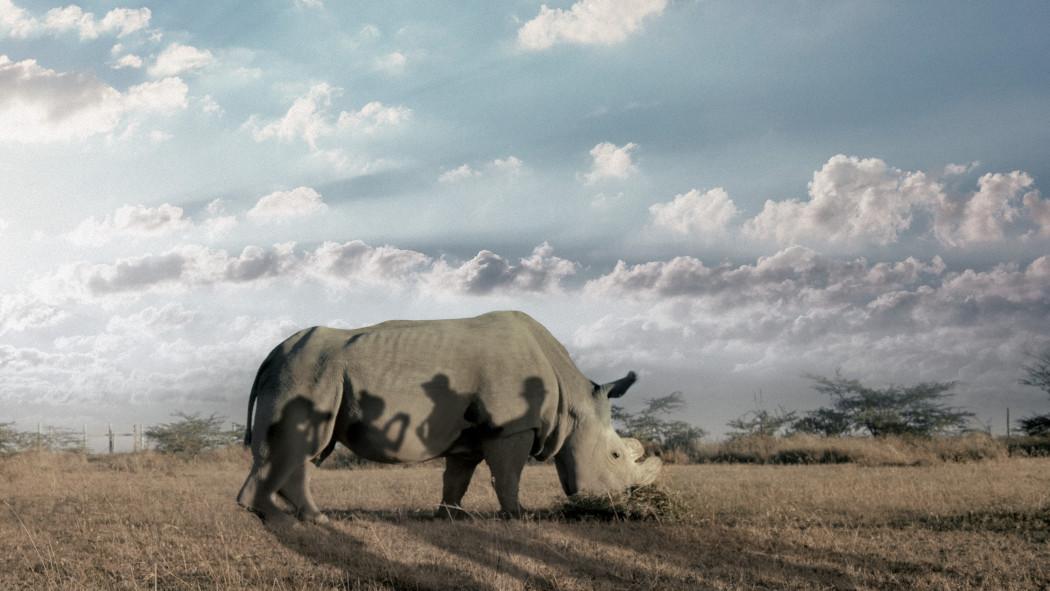The Last Male on Earth: screening & live debate
How far should people go to save an endangered species? Is armed resistance the only solution in the fight against poaching and illegal logging? Will African megafauna soon only exist in zoos, or as frozen sperm and egg cells?
And what about the often-dominant presence of Europeans in African conservation projects?

On International Biodiversity Day, 22 May, the AfricaMuseum invites you to join and think about these and other questions. A panel of international experts will join in the effort during a live debate. The screening of the documentary The Last Male on Earth (2019) by director Floor van der Meulen will provide the spark to start off this discussion.
The film
On 19 March 2018 Sudan, the last male northern white rhino, died in a Kenyan park. He belonged to a subspecies that is about to disappear at the hands of man. Some scientists however continue to believe that the species could one day resurrect using frozen sperm. In The Last Male on Earth director Floor van der Meulen follows the final days of Sudan. Why does a species on the verge of extinction evoke so much emotion?
The debate
Moderator:
- Wendy Bashi (journalist, Belgium/DRC)
Wendy holds a master's degree in Information and Communication from the University of Liège and a degree in "Making TV News" (Thomson Reuters). She has been working for the French-speaking Africa department of Deutsche Welle since May 2017 and is the author of several audiovisual and radio documentaries and reports broadcast on TV5Monde.
Panel members:
- Floor van der Meulen (director, The Netherlands)
Floor studied film at the Willem de Kooning Academy, Rotterdam.
- Corneille Ewango (botanist and activist, DRC)
Corneilleobtained a master's degree in Biology (Tropical Botany) from the University of Missouri, USA, and a PhD from the University of Wageningen, the Netherlands. In 2005 he was awarded the Goldman Environmental Prize, for his tireless dedication to the protection of the Okapi Wildlife Reserve in the DRC during the civil war. Today he is director of the reserve, where he has since established a herbarium for research and education in tropical botany.
- Tim Bouts (zoology director, Pairi Daiza, Belgium)
Tim has a master's degree in Wild Animal Health and specializes in zoo health management. As a veterinarian he also specializes in the anesthesia and medicine of large herbivores such as elephants and rhinoceroses. He is involved in research and conservation of wild animals.
- Mercy Ashepet (biologist, RMCA, Uganda/Belgium)
Mercy holds a master's degree in Biology (Human Ecology) from the Vrije Universiteit Brussel. She has experience in human-wildlife conflict studies in Uganda and consensus-building approaches for managing conservation conflicts. In 2019 she started a PhD at the RMCA, in which she further explores the potential of 'citizen science' in Uganda.
Practical information
The film is in English, with French and Dutch subtitles. The debate will be held in English and French. For technical reasons, the registration form is only in French. Thank you for your understanding.
The documentary will remain available for you to watch online until 23 May 2020, 8pm, via the link in the registration email.
Biodiversity in Central Africa is a common thread both in the research and in the permanent exhibition of the AfricaMuseum.
The Last Male on Earth is a production by Cassette for timescapes and Een van de jongens.
With the technical support of

online
free
The documentary will remain available online until 23 May 2020, 8pm, via the link in the confirmation email of your registration.
Info: tine.geunis@africamuseum.be
